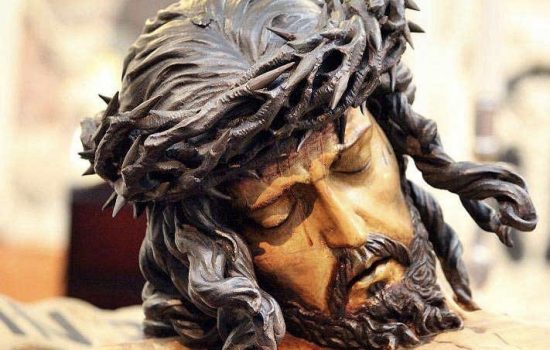From the book “The art of being happy” by Fr. Ignacio Larrañaga
“I have repeatedly witnessed in hospitals the following scene: while I was explaining to those afflicted with incurable diseases how they are participating in the sufferings of the Crucified and how they are accompanying Him in the redemption of the world, I have seen how their faces acquire an aura of inexplicable peace, not to mention a mysterious joy, while they fixed their gaze on the crucifix. They surely felt that suffering is worthwhile because they have found the meaning and usefulness of suffering.
In other words, their pain acquired a creative character like the pain of a mother giving birth. I do not know whether this can really be called joy in suffering. In any case, it is the victory and the satisfaction of one who has taken away from pain its most terrible sting: the meaninglessness and the uselessness.
A sick person useless for everyone, or with any other intribulation by the troubles of life, becomes aware that in faith and in love he is actively participating in the salvation of the brethren; that he is really completing what is lacking in the sufferings of the Lord; that his suffering is not only useful to others but is performing an in substitutable service in the economy of salvation; that he is enriching the Church equally or even much more than the apostles and missionaries; that accepted in love, his sufferings open the way to grace more than any other service; that those who suffer in faith and love make present in the history of the world the power of Redemption much more than anything; and, in the end, they are promoting the Kingdom of God forwards and upwards from within.
¿Why should they not feel satisfaction and joy?
In the course of time, your name will disappear from the archives of life. You grandchildren and great grandchildren will also be buried in oblivion and their names will be carried away by the wind. Of your memory nothing will remain except silence.
But if you have contributed to the redemption of the world by associating yourself to the redemptive work of Jesus through your own suffering, you have opened in the heart of trans-history indelible furrows, which will be erased neither by the wind nor by the rains; you will have realized a labor that transcends all time and space. How could you not feel satisfaction and joy? By this, we begin to understand the grand outburst of Paul when he said: “Now I glory in my sufferings.”
Pain: The Way to Wisdom
Whoever has not suffered maybe likened to a cane of bamboo. It has no solid core; it does not know anything. Deep suffering is like a storm that devastates and razes a wide expanse but, once it has passed, the landscape manifests calm and clear skies.
Heavy tribulation makes a man grow in maturity much more than five years of normal circumstances.
When everything is going well, when there are no difficulties or thorns, man tends to close in on himself to savor his triumphs. His gains and satisfactions tie him to the ground and they appear as high walls fencing him in. He does not notice that the same walls that defend him imprison him at the same time.
If you paused for a while and looked into your life and reflected a little, you will discover that many painful events in your past which at the time looked like misfortunes today, after so many years, you find that they brought you many blessings, detachment, and interior freedom. After so many years, they proved to be providential events in your life, not misfortunes”.
Extracted from the book “The art of being happy” by Fr. Ignacio Larrañaga









